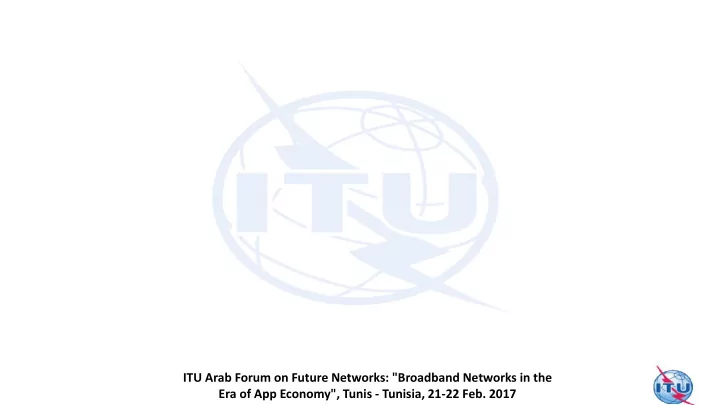

ITU Arab Forum on Future Networks: "Broadband Networks in the Era of App Economy", Tunis - Tunisia, 21-22 Feb. 2017
Electronic communications regulation in the era of broadband networks: Tunisia case Kamel REZGUI Higher School of communications of Tunis, Sup’ Com UIT / CIFODCOM, Tunis February, the 22th, 2017
Main challenges facing the electronic communications regulator 1 • The Tunisian electronic communications regulator will have to manage many challenges • Technological Challenges – The proliferation of broad band networks – Convergence of networks and contents – Internet Neutrality – Applications in particular mobile applications: applications economy – 5 G networks – Big Data, Cloud computing – Internet of things ... 3
Main challenges facing the electronic communications regulator 2 • Economic and regulatory challenges – Regulation of OTS – Nature of regulation: regulation of networks and traffic / regulation of content – Guaranteeing competition in a digital content market increasingly representing economic concentration and dominant positions – Sector regulators rising – Requirements for users protection – Requirements of quality of services – Requirements of resources scarcity – Requirements for pooling and sharing infrastructures – Requirements for universal services ... 4
Main challenges facing the electronic communications regulator 3 • Roles of the telecommunications regulator – To ensure the normal functioning of markets in transparency and fair competition – To guarantee the interests of the various actors: operators, the State, users – To guarantee the growth of investments in the sectors – To ensure the implementation of the state's regulatory policy in the sector ... • Our purpose: – Define orientations during this period of elaboration of different codes relating to electronic communications: digital code, audiovisual code • Effective regulation of the challenges of broadband networks in the light of INT's experience and the best regulatory practices in the world depends on a number of features characterizing the regulator : – the elements characterizing the organic status of the regulator – the elements characterizing the functional status of the regulator 5
Elements characterizing the organic status of the regulator 1 • Juridical nature – Independent public authority: autonomous administrative authorities / independent constitutional bodies ? – Independence from sector actors: principle of separation between regulatory and telecommunications management bodies – In relation to the State and especially to the telecommunications ministry – In relation to telecommunication operators • Financial independence – Autonomous budget – Own Resources – Independent resource management 6
Elements characterizing the organic status of the regulator 2 • Methods of appointing members of the college: – Independence from the telecommunications Ministry – Independence from Government – Appointment by the Head of State, Parliament or other authorities? – Appointment of chair person by peers in college – Appointment of members for an irrevocable mandate – Rules of incompatibility and avoidance of interest conflicts versus operators • Effective composition of the college: – Members appointed for their skills – Diversity of technical, economic and legal skills – A full-time job 7
Elements characterizing the functional status of the regulator 1 • Wide field of competences – Regulation of the entire electronic communications sector – Institutional arrangements to coordinate with other sectoral or general regulators / convergence of networks and contents – Evolution to a convergence regulator? A multi-sector regulator? – Limitation of the powers of the regulator to administrative powers: control and punishment: towards the abolition of contentious powers? – Importance of intermediation, arbitration and amicable resolution of conflicts 8
Elements characterizing the functional status of the regulator 2 • Effective operation rules – An autonomous administrative and financial management body – Separation between : instruction bodies / decision bodies – Sworn auditors – Access of regulator agents to information, and significant investigative and investigative powers . • Strengthening the powers of the regulator – Strengthening the powers of self-referral of infringements – Importance of formal recognition of regulatory authority – Reinforcement of provisional measures, while providing guarantees of defense rights and adversarial proceedings 9
Elements characterizing the functional status of the regulator 3 – Strengthening of sanctioning powers, providing guarantees of defense rights and adversarial proceedings – The framing of the sanctions – Enforceability of decisions • Importance of Career Staff – Distinction between : decision staff / management Staff – Autonomy in recruitment and career management – Special status established and approved by the regulator – Remuneration guaranteeing the competence and independence of the staff • A detailed knowledge of the evolution of markets and technologies • Flexible regulation adapted to the context of the markets 10
Elements characterizing the functional status of the regulator 4 • An ex ante regulation • Importance of coregulation – Soft law – Guidelines – Use of public consultations • Importance of self-regulation – Good behavior charters in economic, regulatory or technical aspects 11
Main features of the regulatory environment for electronic communications • Adoption of an electronic communications code • Consideration of the convergence of the medias in the two current bills on telecommunications and audiovisual • Consideration of the convergence of the medias in other bills relating to the regulatory environment for digital content: freedom of the press and information, protection of personal data, electronic commerce, intellectual property ... • The coordination of the actions of regulators: the importance of co-regulation of electronic communications • Adoption of a technologically neutral regulation: Net Neutrality 12
Thanks for your attention 13
Recommend
More recommend